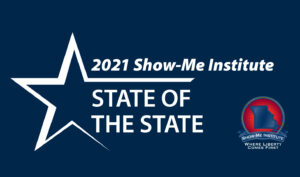
Few would have guessed what 2020 had in store for us, and fewer still need the challenges of last year recounted in detail. Missourians have faced threats to our health and to our democracy, to our communities and to our safety, and indeed to the health and continuity of our social and political institutions. Missourians rose to meet these challenges—challenges often imposed by their own state and local governments—and they succeeded in spectacular ways. Yet there are more obstacles to overcome, more work to do, and more reforms to pursue.
Indeed, great progress can happen in the face of great adversity. With this in mind, we offer our own “State of the State” today, looking backward not only at what Missouri was and has been, but forward with hope to what it is and still could be.
The coronavirus pandemic of 2020 was the biggest story of the past year, and the public education system’s response led to many of the state’s most severe and costly policy failures. And yet, most of the problems in Missouri’s educational system were only aggravated by the pandemic, not rooted in it: the lack of transparency and accountability throughout the educational system, and especially at the State Department of Elementary and Secondary Education (DESE); the inflexibility of the public school system, revealed in its inability to meet the individual needs of students; and the state’s failure to lead or even to follow other states in expanding charter schools and school choice.
The evidence is clear: wholesale reform must come to Missouri’s public schools. In the 2018–19 school year, less than half of Missouri students tested were proficient in Math and Language Arts. On the National Assessment of Educational Progress (NAEP)—a Congressionally mandated nationwide assessment of education systems in America—Missouri 4th-graders have dropped from the top half of the country for reading and math in 1996 to the bottom half today.
These failures didn’t happen all at once, but 2020 forced the problems into the spotlight. Today, 27 percent of parents report that they feel their children are now behind academically, compared to less than 7 percent before last year. Nearly 3 in 10 parents no longer trust their public school system to make decisions that are in the best interest of their children’s education.
Facts matter, and the fact that Missouri parents are losing faith in Missouri schools should alarm policymakers.
How will Missouri meet this challenge? Now more than ever, it is critical that the legislature provide all Missouri students and their families with choices for their education. Parents must have the opportunity to educate their children in other ways if they believe traditional district education is failing them.
To deliver on its education promises to parents and children, the state must pass three key reforms.
First, the state must create education savings accounts (ESAs) that give parents flexible access to a portion of their children’s public education dollars that can be used for other educational resources better tailored to their children’s needs.
Second, the state must unleash the power of charter schools by removing restrictions that unduly restrict their creation and by implementing school choice reforms, like Missouri Course Access (MOCAP), that are already the law. Specifically, the state must designate MOCAP as an independent local education association or charter school and get districts out of the equation.
And third, DESE must finally be the adult in the room and hold schools and districts accountable for what they have and have not done throughout this pandemic.
Especially in districts that have been unable or unwilling to reopen for traditional learning, parents and kids must have the opportunity to go elsewhere to ensure their educational needs are met. These three reforms would help meet not only the challenges of the pandemic today, but the challenges of the modern economy for years into the future.
At the core of the pandemic has been, of course, a health care crisis, and fortunately some headway was made last year in the face of these health care challenges. Thanks to the hard work of Rep. Derek Grier and the support of other public officials and stakeholders, Missouri took an important step in 2020 and removed licensing barriers that prevented out-of-state licensed professionals of all kinds, and health care professionals in particular, from readily providing services to Missourians. Moreover, Gov. Mike Parson acted wisely in ordering the relaxation of the state’s telemedicine and scope-of-practice regulations to better meet the needs of medical management in response to the pandemic.
These supply-boosting measures should be made permanent this year, and they should be the starting point for other necessary reforms. Along with making permanent the state’s telemedicine and scope-of-practice reforms, legislators must repeal Missouri’s certificate of need law, which unnecessarily caps hospital competition in the state, and they should take steps to deregulate health insurance to ensure that Missourians have ample choice and reasonable pricing in their health insurance products. Further, Medicaid will pose a policy and budgetary challenge to the state in the years ahead; legislators will need to work earnestly to mitigate its damage to other state priorities.
Damage to the state economy can happen in other ways, too, and nowhere is this more clear than in the condition of Missouri’s roads. Missourians depend on our roads to get to their jobs and to get their children safely to school; indeed, Missouri relies heavily on transportation for economic growth. Transportation and warehousing businesses employ over 83,500 Missourians, and over $700 billion of products travel over Missouri’s roads and bridges each year. These numbers are only expected to rise, and we cannot let an asset as important as our roads deteriorate through neglect.
Unfortunately, the Missouri Department of Transportation, or MoDOT, says it only receives a little more than half of the revenue it needs to maintain Missouri’s roads and bridges, both now and in the future. Notably, Missouri’s gas tax has not been raised since 1996 and is currently the second-lowest in the country. Toll roads, which work for Missouri’s neighbors, are an option that should also be considered here. Increasing user fees—to make sure that those who use the roads pay for them—is the fairest and best answer to address Missouri’s infrastructure funding problems.
Yet not all state “needs” for revenue are created equal. While increases to user fees in transportation might happen without a tax reduction elsewhere to help resolve MoDOT’s structural funding problems, that carveout from the principles of revenue neutrality and overall tax reform should be an exception, not the rule.
For instance, Missouri remains one of a dwindling number of states that does not require a sales tax on all out-of-state purchases. While proponents suggest, reasonably, that instituting the tax would “level the playing field” for local businesses, it also would increase the tax burden on the people of Missouri. Businesses don’t pay these taxes; Missouri’s families do.
Accordingly, the discussion about a new internet sales tax should start with revenue neutrality as its goal. No time is a “good time” for tax increases, and legislators should not think that hiking taxes as a way to generate new revenue during a pandemic and economic downturn is “good timing.” Taxes should sustain services, not backfill shortfalls, and the state should not impose new taxes on suffering families to solve its temporary, though difficult, budget problems.
And while legislators are “under the hood” of the state’s sales tax system, they should advance an array of other important sales tax reforms.
Those reforms should include a sales tax cap that puts a limit on how many layers of local taxes can be piled on Missouri consumers; the repeal of dining taxes; the reform of special taxing districts so that such projects can’t be used as fiefdoms of the private sector backed by the taxing power of government; and the movement of tax increase votes to November elections to ensure the will of residents is best represented in these elections.
But if state government really wants to help smaller retail businesses—to “level the playing field,” as we’re told internet sales taxes would do—it should start outside the realm of tax policy, by protecting Missouri businesses from the sorts of destructive, asymmetric lockdown orders that have crushed countless entrepreneurs across the state during this pandemic. We see no reason based in public health for allowing casinos to offer blackjack at all hours of the day while restaurants can’t offer dining; nor do we understand why, if Walmart can continue to sell shoes, competing shoe stores cannot also remain open.
No doubt, government officials have had to make hard choices, but they shouldn’t make those choices on the back of small business and to the benefit of their larger corporate competitors.
At the Show-Me Institute, we advance government policies that expand freedom and enrich the lives of our citizens. We also recognize the obstacles erected by special interests inside government itself that, unfortunately, can stand in the way of the public interest. Whether called rent-seeking, cronyism, or soft corruption, such barriers to freedom and the free market are wrong and must be fought at every turn. We’re happy to continue this fight on behalf of Missouri taxpayers.
In closing, here in her 200th year as a state, we’re happy to report that Missouri is strong and her citizens are resilient.
But she can be made stronger and more resilient. Much remains to be done, whether in education, or health care, or transportation, or taxation, or the fight against cronyism. We are more determined than ever to continue our efforts to make our state better, hold our leaders accountable, and offer greater freedom and a better life to our fellow citizens.




